The biomass energy sector is reeling from the dramatic downturn of Enviva, the world’s leading wood pellet manufacturer. This month marked a critical point as Enviva, a key supplier of wood pellets for power plants transitioning away from coal, reported staggering losses in its third quarter. The financial fallout triggered a sharp decline in Enviva Partners Stock, a leadership change, and raised serious questions about the company’s future viability.
Established in 2004, Enviva sources wood from forests in the Southeastern U.S., operating ten plants that are crucial in supplying wood pellets to major energy producers in the European Union, the United Kingdom, Japan, and South Korea. These nations classify burning wood as a renewable energy source, a categorization underpinned by carbon accounting methods that are increasingly under scrutiny.
Concerns about Enviva’s sustainability claims have been voiced before. In 2022, a former Enviva manager turned whistleblower spoke to Mongabay, alleging that the company’s green image was misleading. More recently, this same whistleblower pointed to fundamental operational weaknesses as a primary cause for Enviva’s current crisis. These weaknesses include poorly constructed factories with unreliable machinery and significant miscalculations in wood procurement expenses.
The implications of Enviva’s potential collapse are far-reaching. The global biomass energy market and the supply of wood pellets are now uncertain. Nations in Europe and Asia depend on Enviva’s output to fuel their power plants and to meet their commitments to reduce carbon emissions, relying on the disputed premise that burning forest wood is a carbon-neutral energy solution.
This year has proven to be financially disastrous for Enviva, the dominant force in wood pellet production for biomass energy. Having already absorbed over $250 million in losses and anticipating further deterioration in the fourth quarter, the company itself has acknowledged the severe uncertainty surrounding its ongoing operations. This situation inevitably casts a shadow over the value and stability of Enviva Partners stock.
The predicament also extends to Enviva’s international clientele in the EU and Asia. These entities rely on Enviva for the wood pellets they combust in converted coal plants. Without a reliable pellet supply, these nations face challenges in meeting their energy demands and fulfilling their pledges under the Paris Agreement for carbon emission reductions.
For many financial observers tracking the company, Enviva’s near-collapse appeared to be a sudden and unexpected event. However, was this downturn truly abrupt, or was it a crisis long in the making?
“These problems have been brewing for years,” a former Enviva maintenance manager revealed in an interview with Mongabay. “The core issues are rooted in the cost of wood and the struggle to maintain consistent plant operations at full capacity. These challenges have now converged, culminating in the current predicament.”
In exclusive discussions with Mongabay, this former Enviva employee, who held a senior operations role at two of Enviva’s ten plants in the Southeast U.S. between mid-2020 and mid-2022, provided critical insights. His firsthand account sheds light on the operational vulnerabilities that underpin Enviva’s current financial distress, directly impacting the performance of Enviva Partners stock.
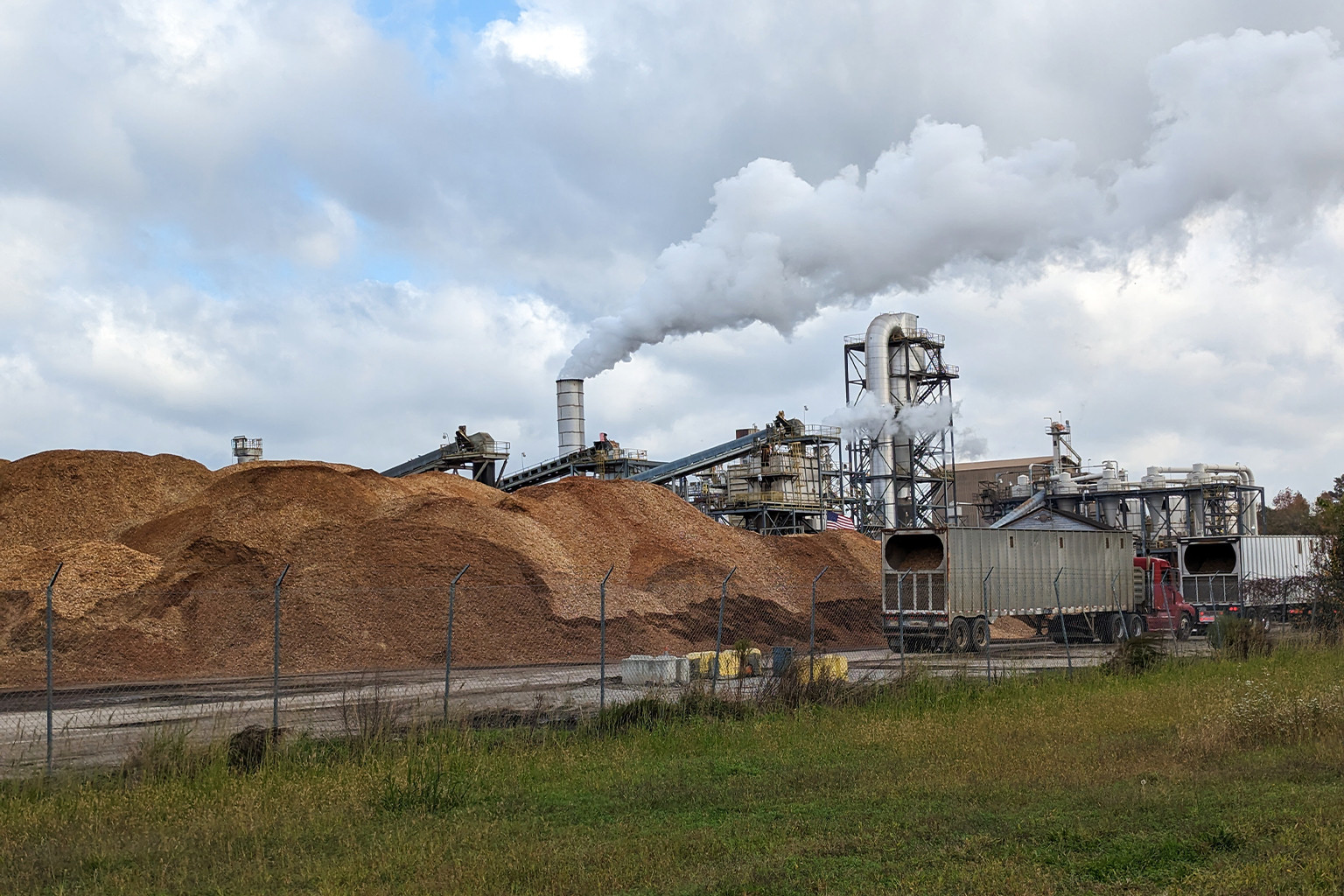 Small mountains of forest wood, chipped from whole trees and loaded into tractor-trailers for delivery, are piled up outside the Enviva wood pellet mill in Ahoskie, North Carolina.
Small mountains of forest wood, chipped from whole trees and loaded into tractor-trailers for delivery, are piled up outside the Enviva wood pellet mill in Ahoskie, North Carolina.
According to this whistleblower, who previously spoke to Mongabay in December 2022 in a widely circulated exposé, Enviva’s troubles are not new. He was the first industry insider to publicly challenge the biomass giant’s claims. At that time, he accused Enviva of misrepresenting its environmental credentials and being dishonest about its wood sourcing practices. These revelations already cast a shadow on the long-term prospects of Enviva Partners stock.
“The company claims they primarily use waste like branches, treetops, and discarded wood to produce pellets,” the whistleblower stated last year. “That’s simply untrue. We use almost exclusively whole trees. Waste usage is minimal. Pellet density, which is crucial, is achieved using whole trees, not low-quality waste.”
The crux of the issue is the cost difference between wood waste and whole trees. Waste wood is inexpensive, while whole trees represent a significant expense, forming a core part of Enviva’s operational difficulties and contributing to the volatility of Enviva Partners stock.
The former employee, who requested anonymity to safeguard his privacy, explained that this deceptive wood-sourcing narrative is a key factor in Enviva’s financial losses. This directly impacts the bottom line and investor confidence in Enviva Partners stock.
“Enviva’s business model was predicated on the idea that they utilize mostly scrap and waste from lumber operations,” he elaborated. “If that were accurate, their raw material costs would be negligible. However, they must purchase substantial quantities of whole trees, competing with other industries for timber. Loggers naturally sell to the highest bidder, inflating wood prices—a cost factor Enviva cannot control.” This unsustainable procurement model puts further pressure on the financial performance reflected in Enviva Partners stock.
In its third-quarter filing with the Securities and Exchange Commission on November 9, 2023, Enviva cited “the availability of affordable wood fiber for procurement and processing” as a major factor affecting its financial stability. This acknowledgment underscores the whistleblower’s claims and highlights the risks associated with Enviva Partners stock.
“So, that’s the primary problem,” the former employee summarized. “The cost of your raw materials is far higher than you’re admitting, and that’s before even considering the pellet production costs.” These escalating costs are directly reflected in the declining performance of Enviva Partners stock.
Enviva did not respond to multiple requests from Mongabay for comments on these allegations and its financial situation. This lack of transparency further fuels uncertainty surrounding Enviva Partners stock.
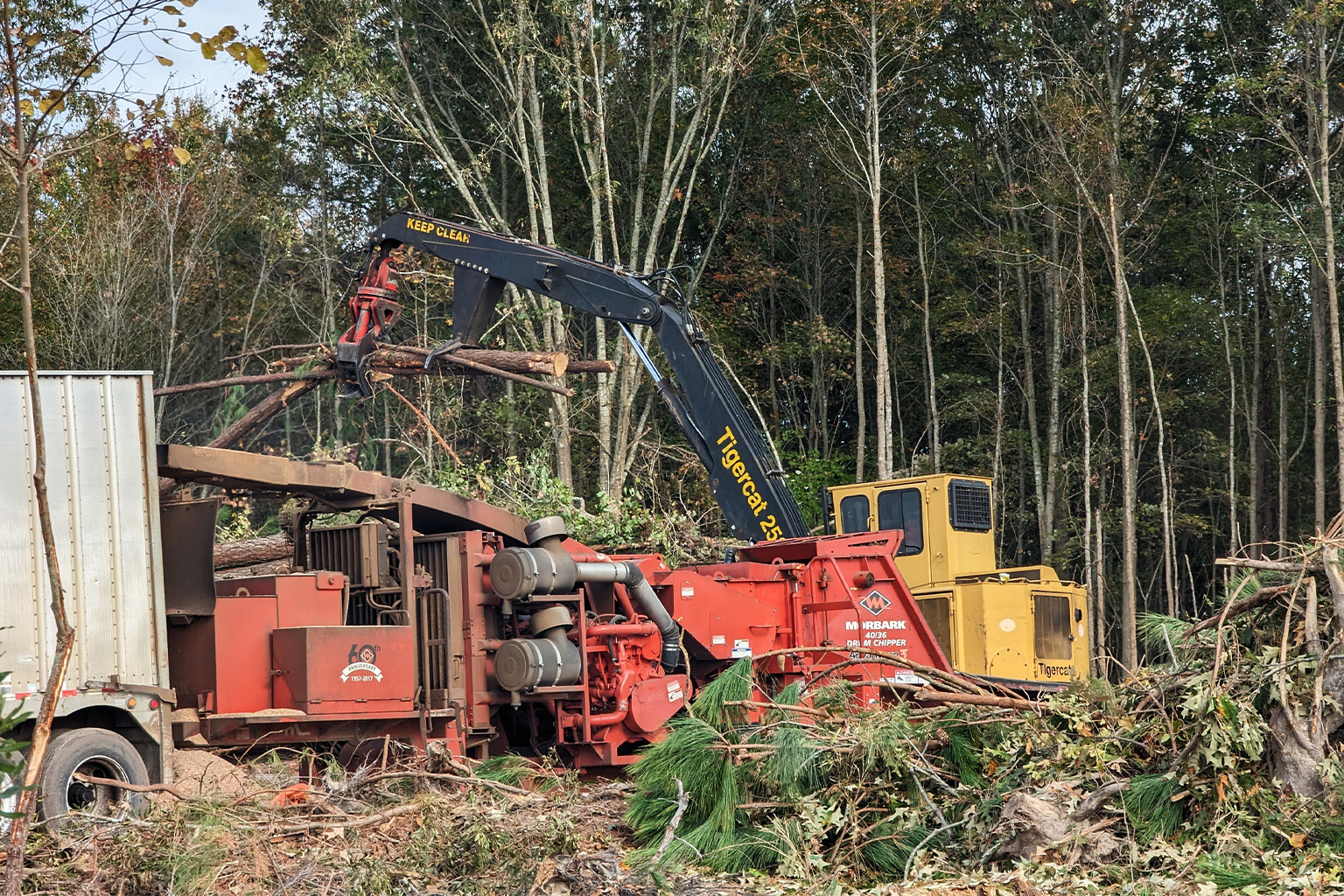 While the company claims it uses mostly wood scraps and treetops for its pellets, Catanoso witnessed whole trees being chipped for Enviva
While the company claims it uses mostly wood scraps and treetops for its pellets, Catanoso witnessed whole trees being chipped for Enviva
A Timeline of Collapse and Enviva Partners Stock
In 2022, Enviva appeared poised for continued financial expansion. Revenue surpassed $1 billion for the second consecutive year, a 24% increase from two years prior. Enviva Partners stock reached a peak of $87 per share in April 2022. The company secured new long-term contracts with publicly subsidized clients across Europe and Asia, solidifying its dominance in the global wood pellet market. These successes initially painted a positive picture for Enviva Partners stock.
Enviva confidently projected a doubling of pellet production, from 6.2 million metric tons in 2022 to 13 million metric tons by 2027. With ten operational mills across the U.S. Southeast, the company obtained a $570 million credit line to finance the construction of even larger plants in Alabama and Mississippi. This aggressive expansion strategy was initially seen as a growth driver for Enviva Partners stock.
At this juncture, Enviva seemed to disregard criticism from environmental groups who argued that the company was exacerbating deforestation amidst a climate crisis. These groups highlighted the renewable energy policy loophole that, with questionable scientific basis, classified wood burning as carbon-neutral. Despite these growing concerns, Enviva Partners stock remained relatively robust.
Since its inception in 2004, the company had enjoyed a consistent upward trajectory. However, the first signs of significant trouble emerged on May 3rd of this year, with the release of first-quarter results. Wall Street analysts, previously optimistic about Enviva Partners stock, were taken aback when the company announced a $117 million loss for the January-March period—three times worse than projected. Enviva subsequently canceled its shareholder dividend, a clear warning signal for a company in financial distress, and a major blow to Enviva Partners stock. The stock price plummeted from $21 to below $8 within hours, signaling a dramatic shift in investor sentiment towards Enviva Partners stock.
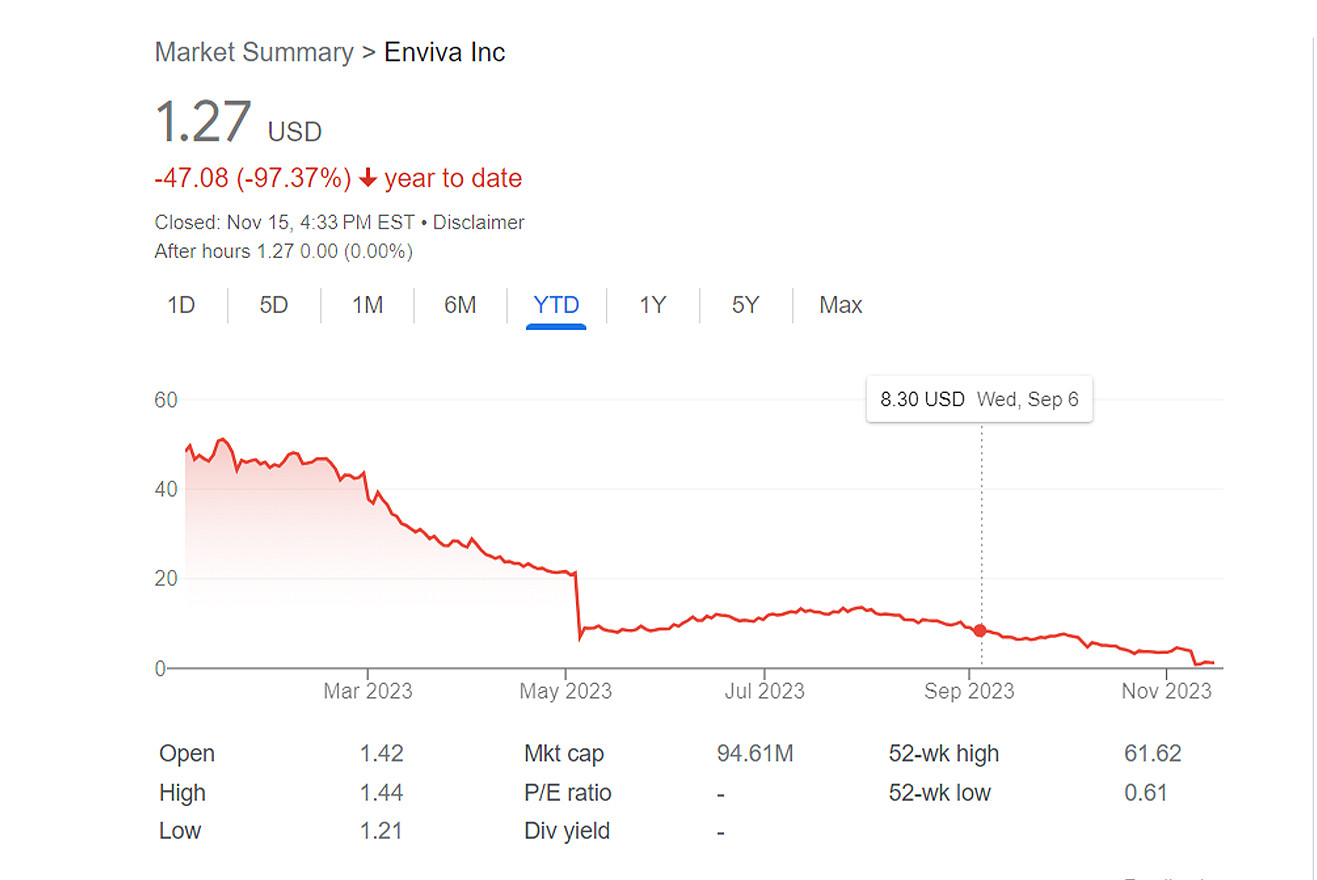 Enviva’s stock collapse this year
Enviva’s stock collapse this year
In a conference call, then-CEO Thomas Meth briefly mentioned operational challenges at Enviva’s Southampton, Virginia plant, stating they were a priority. However, the situation deteriorated sharply by November 9th with the release of Enviva’s third-quarter results. Another $85 million loss was reported, four times greater than the losses in the same quarter of the previous year. Enviva Partners stock, which had briefly recovered to over $13 in August, collapsed to 61 cents as major shareholders divested their holdings. The company disclosed that it had exhausted its $570 million credit line, jeopardizing the completion of the Alabama and Mississippi plants. This news further decimated the value of Enviva Partners stock.
Meth was subsequently demoted to president, and Enviva issued a stark warning: “The aggregate conditions and events raise substantial doubt regarding the company’s ability to continue as a going concern.” This statement sent shockwaves through the market and further eroded confidence in Enviva Partners stock.
Glenn Nunziata, who had recently joined Enviva as CFO, was appointed interim CEO. In an investor call on November 9th, Nunziata referred to the Southampton plant, noting operational improvements achieved by shutting down half of its pellet production lines. This partial shutdown, while intended to cut costs, also reflects deeper operational issues impacting Enviva Partners stock.
The former Enviva maintenance manager explained the underlying reasons for these operational decisions, connecting them to the broader financial woes impacting Enviva Partners stock.
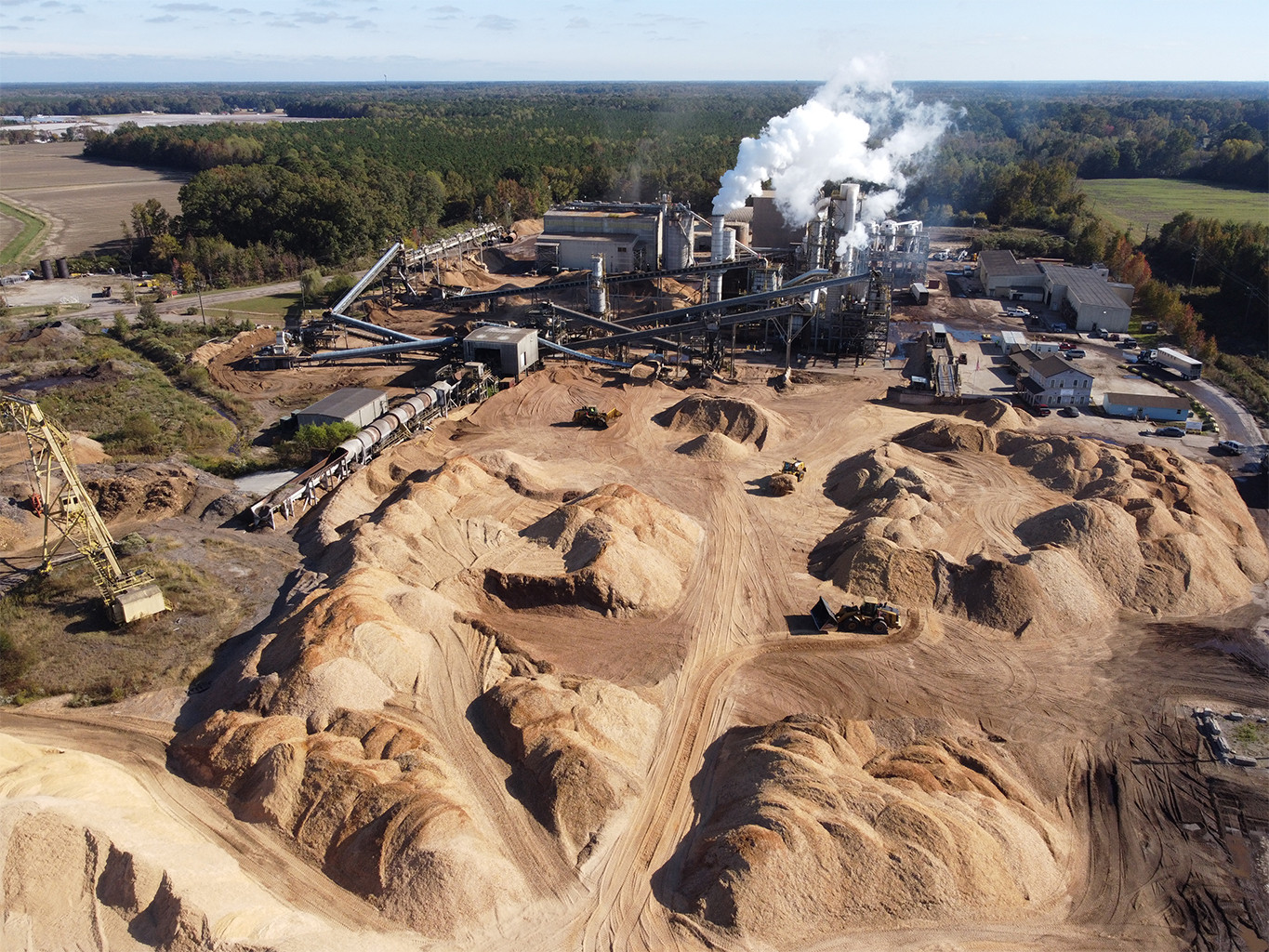 This aerial view of Enviva
This aerial view of Enviva
The Core Problem: Material Costs and Inefficient Infrastructure Impacting Enviva Partners Stock
Enviva’s initial plant designs, including the first four in North Carolina and the Southampton, Virginia facility, aimed for a wood mix of 80% hardwoods and 20% pine. This ratio proved unsustainable, contributing to the problems now reflected in Enviva Partners stock.
“Enviva’s operations shifted to using 80% pine and 20% hardwood due to cost,” explained the former employee, a trained mechanical engineer. “Let’s debunk the Enviva myth: they are not using free scraps; they are buying whole trees. Hardwood is significantly more expensive. Pine offers a higher thermal value and is cheaper to procure.” However, this cost-saving measure had unforeseen consequences for Enviva Partners stock.
“However,” he continued, “the company’s wood scientists should have recognized the resin and pitch content in pine. Processing pine is not environmentally benign due to air pollution emissions. Crucially for equipment maintenance, pine is corrosive to anything except stainless steel. Our machinery is constructed from carbon steel,” which rapidly degrades when exposed to moisture, particularly from resinous pine. This material choice was a critical flaw that has significantly affected Enviva Partners stock.
Had Enviva primarily processed hardwood, the manufacturing infrastructure might have been more durable, potentially controlling pellet production costs. However, the decision to use carbon steel for machinery, while initially cheaper, proved inadequate for the demands of continuous pine processing, directly impacting the cost efficiency and ultimately the value of Enviva Partners stock.
“I was astounded by what I observed,” the former maintenance manager recounted. “The carbon steel chains and conveyors were being eroded by the pine. These are massive components, and the entire system is deteriorating due to material incompatibility. Replacement is the proper solution, but prohibitively expensive. Instead, we resorted to temporary fixes costing $700,000 to $1 million—just to patch things up temporarily.” These repeated, costly repairs further strained Enviva’s finances and negatively impacted Enviva Partners stock.
The combination of increased wood procurement costs and escalating equipment maintenance expenses reduced production output and inflated pellet manufacturing costs. This combination transformed Enviva’s profitability into losses under fixed-price pellet contracts, a financial strain directly mirrored in the poor performance of Enviva Partners stock.
Enviva’s SEC filing on November 9th attributed $21.1 million of its $85.2 million third-quarter losses to “asset impairments,” an accounting term indicating damaged equipment. This substantial figure underscores the operational challenges and their direct financial impact on Enviva Partners stock.
The company also stated that its survival hinges partly on “our ability to renegotiate customer contracts,” suggesting a desperate attempt to revise terms to mitigate losses and potentially stabilize Enviva Partners stock.
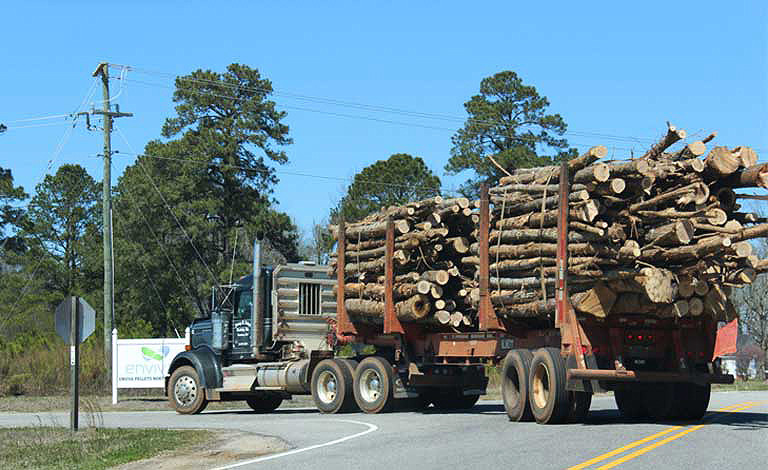 A loaded logging truck pulls into the Enviva biomass wood pellet plant in Northampton, North Carolina.
A loaded logging truck pulls into the Enviva biomass wood pellet plant in Northampton, North Carolina.
 In the spring of 2019, investigators tracked logging trucks coming from a mature hardwood forest and going to Enviva’s Northampton, North Carolina, facility.
In the spring of 2019, investigators tracked logging trucks coming from a mature hardwood forest and going to Enviva’s Northampton, North Carolina, facility.
Uncertain Global Implications and the Future of Enviva Partners Stock
Forest advocacy groups, long critical of Enviva’s environmental impact, welcomed the company’s financial crisis, stating it was an expected consequence of a flawed business model. These long-standing concerns are now amplified by the dramatic decline of Enviva Partners stock.
“Enviva built a business model on environmental injustice and forest destruction,” stated the Dogwood Alliance. “The industry operates on greenwashing, flawed climate science, extensive clearcutting, and disregard for community safeguards.” These ethical and environmental criticisms add another layer of risk to investing in Enviva Partners stock.
Numerous questions remain about the broader impact. Despite Enviva’s troubles, U.S. wood pellet exports were up 6% through September 2023. However, if Enviva, with its significant production capacity, falters, the global supply chain will be significantly disrupted. The uncertain future of Enviva’s assets, particularly its potentially dilapidated plants, further clouds the outlook for Enviva Partners stock.
Drax, a major Enviva customer with its own pellet production facilities, has not commented on Enviva’s situation. Similarly, major Asian customers like Sumitomo and Mitsubishi Corporation have shown no indication of intervention. This lack of apparent support adds to the precariousness of Enviva Partners stock.
Fenna Swart, a forest advocate in the Netherlands, suggests Enviva’s crisis could be a catalyst for a shift away from biomass energy in Europe. This potential policy change could further undermine the long-term viability of the biomass industry and consequently, Enviva Partners stock.
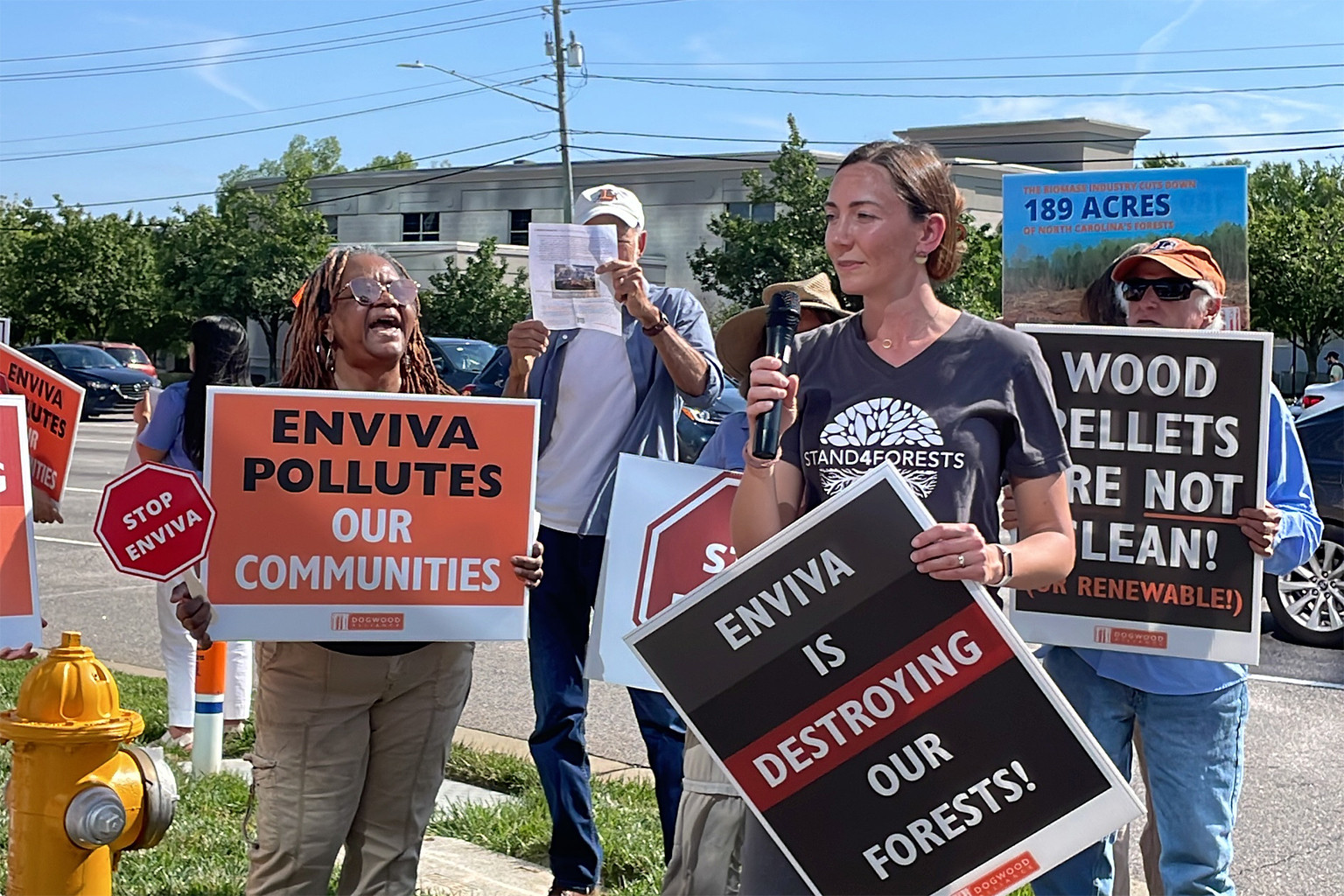 Forest biomass protestors outside Enviva
Forest biomass protestors outside Enviva
“If Enviva indeed cannot fulfill its pellet shipments to Europe, the EU, and especially the Netherlands, are expected to capitalize on this opportunity to accelerate the phase-out of biomass energy subsidies,” Swart stated. This policy shift could drastically reduce the demand for wood pellets, directly impacting companies like Enviva and the value of Enviva Partners stock.
“With Enviva’s potential shortfall, European governments may pivot towards natural gas as a transitional fuel and redirect biomass subsidies to genuinely sustainable energy sources like hydrogen, and invest more in energy efficiency,” Swart concluded. This potential redirection of investment away from biomass further emphasizes the risky proposition of Enviva Partners stock.
Conclusion:
Enviva’s rapid financial decline and the dramatic plunge of Enviva Partners stock highlight the significant risks inherent in the biomass energy sector. Operational inefficiencies, unsustainable sourcing practices, and increasing scrutiny over the environmental claims of wood biomass have converged to create a perfect storm for Enviva. For investors, the future of Enviva Partners stock remains highly uncertain. The company’s ability to renegotiate contracts, address its operational shortcomings, and regain investor confidence is questionable. The broader implications for the biomass energy market and the renewable energy strategies of nations reliant on wood pellets are equally uncertain, suggesting a cautious approach to any investment decisions related to Enviva Partners stock.
This analysis is based on publicly available information and expert commentary. It is not financial advice. Investors should conduct their own thorough research before making any decisions regarding Enviva Partners stock.
Banner image: Aerial view of Enviva’s Sampson County facility, illustrating the scale of whole tree usage, a key factor in their financial challenges.
Justin Catanoso, a regular contributor to Mongabay, is a journalism professor at Wake Forest University.
Financial downturn at Enviva could mean trouble for biomass energy
FEEDBACK: Use this form to send a message to the author of this post. If you want to post a public comment, you can do that at the bottom of the page.
Credits
Glenn Scherer Editor
Topics
BioenergyBiomass BurningBusinesscarbonCarbon EmissionsCarbon SequestrationClimate ChangeClimate Change And ForestsClimate Change PolicyClimate Change Politicsclimate policyControversialCorporate ResponsibilityCorporationsDeforestationDrivers Of DeforestationEnergyEnergy PoliticsEnvironmentEnvironmental LawEnvironmental PolicyEnvironmental PoliticsFinanceGlobal Environmental CrisisGlobal WarmingGlobalizationGreenhouse Gas EmissionsIndustryLawLoggingRenewable EnergyTimberwoodNorth AmericaNorth CarolinaUnited StatesEnviva